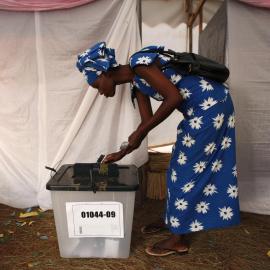To the Editor:
Alan J. Kuperman's "Rwanda in Retrospect" (January/February 2000) and the subsequent responses debate the availability of information to Western decision-makers that could have allowed them to act expeditiously to prevent the 1994 Rwandan genocide or stop it once it began.
The basic problem was not the availability of information but rather that only information reported by Western sources was deemed credible. In Rwanda, both the preparations for genocide and the orders to kill were propagated in the extremist media, including the notorious Radio-Television Libre des Mille Collines. Many Rwandans, the leadership of the Rwandan Patriotic Front included, shouted loud and clear warnings that large-scale massacres were in the offing, and when they occurred, that genocide had begun.
The world rarely listens, however, unless that same information is repeated by a "Western" source. These reports, in turn, are often clouded by underlying perceptions and presumptions that are sometimes completely at odds with the African experience. Therein lies the fundamental paradox of erroneous decision-making in the globalized world, as far as our continent is concerned.
Richard Sezibera
Ambassador of Rwanda to the United States
